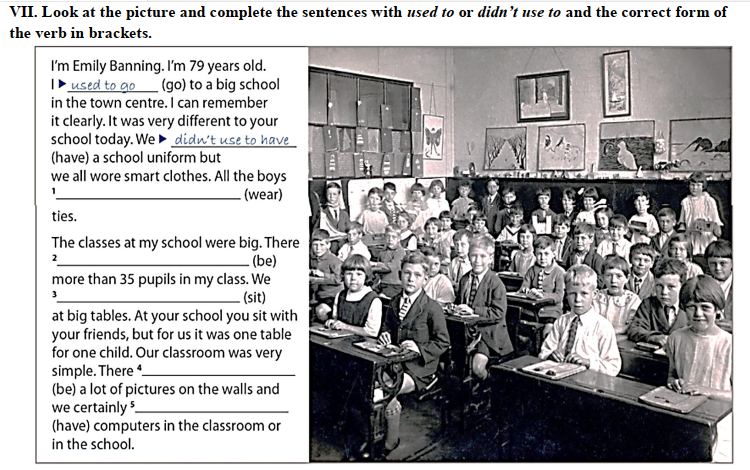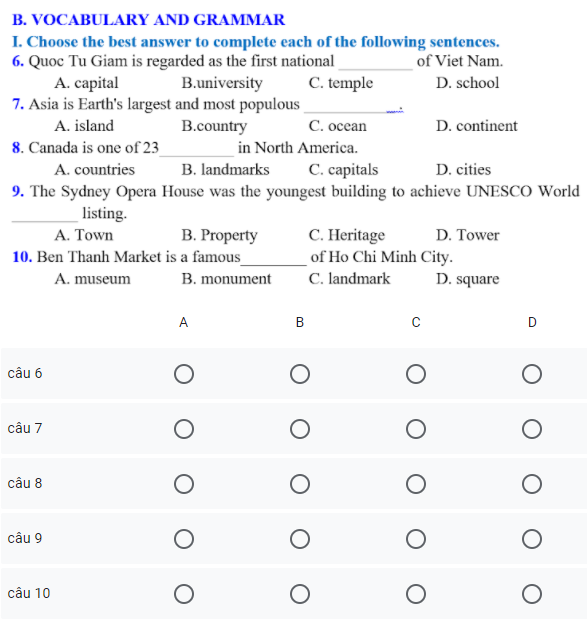
Hãy nhập câu hỏi của bạn vào đây, nếu là tài khoản VIP, bạn sẽ được ưu tiên trả lời.


Đây mới được gọi là ngắn thật sự
By 2030, robots will be able to play tennis. It will be able to play very well. Robots will be look after children or old people. It will be able to feed babies or pets. It will be able to feed careful. Robots will be able to talk with people but It can talk with people now. Robots won't be able to find and repair problems in our bodies. And robots won't be able to understand what web think. By 2030, I think that robots will be useful.
Tick giùm mình với nhé bạn
Getting policies right for issues like self-driving cars and unmanned aerial vehicles is tough, but doable. Latin America isn’t significantly behind the regulatory curve. Even in the U.S., only a few states have passed rules regulating self-driving vehicles, and the Federal Aviation Administration is just this year getting around to publishing regulations on civilian drone use. Once the region’s policymakers realize that these safety issues are less than a decade away (if not already here today), they will, hopefully, begin to act.
However, addressing the impact of robotics on the economy and the labor market is much more difficult. How does the region prepare for a technology revolution that will upend millions of jobs and dozens of industries vital to regional economies? How can Latin American countries prevent the inevitable wave of economic disruption from escalating into a crisis of political stability?
There is nothing Latin American governments can or should do to slow technology’s progress in their countries.
Instead, they need to find ways to embrace the positive aspects of robotics. Even if the above sections appear a bit pessimistic, the potential of self-driving cars to reshape urban transportation, of unmanned drones to remake the logistics industry, and of robotics in general to make industries more productive and to push the boundaries of what is technologically possible could provide great benefits to Latin America and the rest of the world.
Some of the policies needed to address advances in robotics are obvious. Nearly everyone agrees on the importance of building educated, innovative and adaptive workforces. However, the reality of building those workforces requires Latin American governments to make politically difficult choices. These include raising taxes to pay for investments in education from pre-kindergarten to post-graduate levels that will enable the next generation to succeed.
Additionally, while government investment in research and development is essential, innovation is really going to come from the bottom up. Policymakers need to streamline the process of building businesses and—perhaps more importantly—of creating cultural and legal frameworks in which innovative, technology-driven businesses can fail productively. Innovation requires entrepreneurs to take risks, but they are less likely to do so when harsh bankruptcy laws and a culture that punishes unsuccessful risk-takers in the business environment hold those entrepreneurs back.
On education, small-business creation, social safety nets, and regulations, the policy choices made in the next 10 years are going to determine whether Latin America embraces the benefits of robotics or faces a new lost decade, as it did in the 1980s. The economic transition to a greater use of automation and artificial intelligence is going to disrupt economies and create social tension, but some of the difficulties can be mitigated and some opportunities can be grasped if the region begins acting early.
The most important step is to get more of Latin America’s politicians, think tanks and civil society to discuss and debate the coming technology revolution. Unfortunately, many of the hemisphere’s political leaders spend more time discussing Cold-war era disputes than technology issues affecting the vast majority of Latin America today and into the coming decade.
The region’s politicians aren’t going to spend time discussing robotics until they feel pressure from voters and civil society.



I always want to have a beautiful bus to I take everyone go to anywhere. It has forty- five chairs. It is big and it red.

Linh Diệu Linh Nguyễn Lê Nguyên Hạo Phương An
Giúp em với @_@ ![]()
chỉ cần trả lời những câu hỏi trong sách rồi ghép thành một đoạn văn có ly la xong . Nếu thầy cô bắt vẽ thì vẽ gống trong sách

I / like / don't / any / coffee / . I / some / Can / have / orange / juice ?
\(\Rightarrow\) I don't like any coffee . Can I have some orange juice ?

In my daily life, I have several hobbies such as cooking, surfing, listening to music and so on. However, I like reading books the most for some reasons. Firstly, reading makes me feel comfortable after many long stressful hours at school. I actually like comic books because they contain lots of colorful and interesting images that keep my spirit relax. Secondly, reading books provides me a great deal of diverse knowledge of many fields. For instance, I can know more specific culture of each country in The World’s Cultures book. In addition, I can know more things about different life of various animals that are living around the world in the Discovery of Animals World book. Finally, reading helps to enhance my vocabulary in both Vietnamese and English language. In Vietnamese book, I can learn many traditional folks or proverbs that help me understand more deeply the beauty of my mother tongue. About English books, I can improve my English reading comprehension skill in study. Besides, my communication skill with the foreigners will be better, too. In conclusion, I really like reading books, for it brings many good things to me. I see it as an useful activity to learn how to make life more meaningful and beautiful.
People say that book is the endless source of knowledge, and luckily my favorite activity in my free time is reading books. I read many different kinds of books, such as science fiction, documentary, and horror stories. I live in two different worlds, the first one is my daily life, and the second one in is in the books. I can spend hours reading about a thrilling adventure, a remarkable discovery, or a magical journey. I find those details become more and more realistic when I am deep in to them, and I can experience another fascinating world. Among many books that I have read, my favorite series is Harry Potter. The story is about a little wizard with his great journey to destroy the dark force. I have been reading books since I was a kid; therefore I have a rich imagination and plenty of ideas about almost everything. Everyone has his or her own hobby, and I am glad that I spend my free time and my mind on something that is very helpful.
Dịch:
Mọi người nói rằng sách là nguồn kiến thức vô hạn, và may mắn là hoạt động yêu thích nhất của tôi trong thời gian rảnh là đọc sách. Tôi đọc rất nhiều loại sách khác nhau, ví dụ như khoa học viễn tưởng, sách tài liệu và truyện kinh dị. Tôi sống trong hai thế giới khác nhau, cái đầu tiên là cuộc sống thường ngày của tôi, cái thứ hai là trong những quyển sách. Tôi có thể dành hàng giờ để đọc về một cuộc phiêu lưu gây cấn, một phát hiện quan trọng hay một hành trình ma thuật. Tôi thấy những chi tiết đó càng lúc càng trở nên chân thật khi tôi đắm chìm vào đó, và tôi được trải nghiệm một thế giới đầy sức hấp dẫn khác. Trong số rất nhiều quyển sách tôi đã đọc, tôi thích nhất là loạt truyện Harry Potter. Câu chuyện đó về một cậu bé phù thủy cùng hành trình vĩ đại để tiêu diệu thế lực đen tối của mình. Tôi đã đọc sách kể từ khi còn là một cô bé, vì thế tôi có được trí tưởng tượng phong phú và rất nhiều ý tưởng cho hầu hết mọi việc. Mỗi người đều có một sở thích riêng, và tôi mừng vì mình đã dành thời gian và tâm trí cho một việc rất có ích.




Is this a test?
test